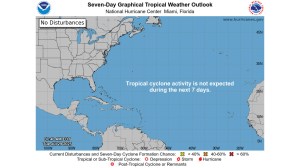Officials: Be aware of kids in cars
Published 9:55 am Thursday, May 26, 2016

Photo submitted / In order to prevent hot car deaths, local officials are encouraging Lincoln County residents to be aware when traveling with children this summer. Mississippi had 14 heatstroke car deaths in children from 1998 to 2015, the sixth-worst per capita rate in the nation.
As summer rolls into Lincoln County with full force, parents are encouraged to remain focused on children in the backseat of their vehicles in order to prevent heatstroke car deaths.
Although Brookhaven and Lincoln County have not experienced a hot car death incident, Fire Chief Tony Weeks urges anyone responsible for a child to be aware at all times.
“Focus on the fact that you have a child in your care,” Weeks said. “Don’t get distracted. Many of these incidents occur when people get distracted and get in a hurry. I don’t think anyone would intentionally leave a child in a car, but things happen when your mind is somewhere else. Remember when you’ve got a little one in the back seat. Focus on that child.”
Trending
Children aren’t Weeks’s only concern.
“As far as animals go, I wouldn’t leave them in a car even with a window cracked,” Weeks said. “The temperature in the summer months gets really hot, really quick. I would not recommend anyone doing that.”
Jan Null, a lecturer and meteorologist at San Jose State University, found in a 2005 study that the temperature inside a vehicle can rise more than 40 degrees in less than an hour.
Null has counted an average of 37 heatstroke deaths of children in vehicles per year from 1998 to 2015 and seven so far this year. Mississippi had 14 deaths from 1998 to 2015, the sixth-worst per capita rate, Null said.
Hot car deaths are the leading cause of non-crash related fatalities for children 14 and younger, according to the National Highway Traffic Safety Administration. Approximately 54 percent of child heatstroke deaths were because the child was forgotten in the vehicle by a distracted parent or caregiver, NHTSA said.
In an effort to prevent child heatstroke deaths in cars, NHTSA launched its, “Where’s the baby? Look before you lock,” campaign in 2011. The campaign outlines simple reminders to adults, including:
Trending
• Write a reminder note about the child and put it on the car door or dash to see it when you leave the vehicle.
• Set a reminder on your cell phone to alert you to check that you dropped your child off at daycare.
• Place a purse, briefcase or cell phone in the back seat next to the car seat to remind yourself that your child is in the car.
• Keep a familiar object in your child’s safety seat, such as a stuffed toy, so when you remove it after buckling up your child, you can place the object in the front seat as a reminder to always check the back for your child.
• Never let kids play in an unattended vehicle or leave a child alone in a car, even if you leave the windows partly open or the air conditioning on — even for just a few minutes.
While 20 states have made it illegal to leave children alone in vehicles in at least some circumstances, Mississippi has not. Parents can still face criminal charges under other laws, though.
Sen. Sally Doty, R-Brookhaven, said she was not familiar with any current legislation to address the hot car deaths.
“I think that awareness — not legislation is the answer to these terrible tragedies,” Doty said. “Parents of young children are so often overwhelmed and sleep-deprived. We all need to reach out and support these families.”
Mississippi has been faced with two incidents of hot car deaths in the last month after the children’s parents forgot they were in the vehicle.
The first occurred in Gluckstadt May 11 when 2-year-old Caroline Bryant was found dead in the back seat of her mother’s car after the mother forgot to drop her off that morning at a child care facility. Amy Bryant of Brandon returned to the child care facility to pick up her daughter, only to be told she had never dropped the child off. Madison County Sheriff Randy Tucker called it a “tragic accident” and didn’t file charges.
Madison County District Attorney Michael Guest said charges are still possible in the case.
The second case involved 8-month-old girl Shania Caradine who was found dead on May 19 in the back seat of her father’s car, which was parked outside a restaurant where he was working. Grenada Assistant Police Chief George Douglas said the father, Joshua Blunt, 25, told police he went inside the restaurant and forgot about his daughter, who he was supposed to drop of at her grandmother’s house.
Blunt was charged with second-degree murder and was being held at the Grenada Count Jail on a bail of $250,000. Blunt’s attorney Carlos Moore announced Wednesday that Grenada City Prosecutor Jennifer Adams decided not to pursue the second-degree murder charge.
Janette Fennell, founder and president of the Kansas-based KidsAndCars.Org, said that between 1990 and 2015, charges were brought in 45.5 percent of cases involving the deaths of children in hot cars in the U.S., and no charges were brought in 44.5 percent of cases. It was unknown if charges were brought in the remaining 10 percent of cases, she said.
The group’s figures show there were 706 cases of children dying in hot cars for those 25 years, although some cases involved multiple deaths.
Using a slightly shorter set of years, from 1990 to 2014, Fennell said there were 726 deaths of children in hot cars in the U.S.
“This topic has no income level, no race, no religion,” Fennell said. “It can happen to absolutely anyone.”
She said some people are quick to say parents who leave children in hot cars are monsters, but Fennell disagrees.
“It really has to do with the way our memory lets us down,” Fennell said.





